Join host Frankie Picasso and me for the latest Movies with Meaning segment on Frankiesense & More radio today, November 30, at 1 pm ET. We’ll discuss a number of new movie releases and other film-related news. Tune in for some lively movie talk!
Thursday, November 30, 2017
On the Radio Today!
Wednesday, November 29, 2017
‘Three Billboards’ explores the lengths to which we’ll go for justice
“Three Billboards Outside Ebbing, Missouri” (2017). Cast: Frances McDormand, Woody Harrelson, Sam Rockwell, Lucas Hedges, Peter Dinklage, John Hawkes, Zeljko Ivanek, Caleb Landry Jones, Abbie Cornish, Amanda Warren, Sandy Martin, Clarke Peters, Malaya Rivera Drew, Kerry Condon, Samara Weaving, Darrell Britt-Gibson, Kathryn Newton. Director: Martin McDonagh. Screenplay: Martin McDonagh. Web site. Trailer.
Seeking justice can be a slow, tedious process that severely tries one’s patience. The frustration that sets in can weigh heavily on those who want their wrongs righted, perhaps pushing them to take desperate measures. But, as understandable as those circumstances are, is the pursuit of such drastic steps truly warranted? Will they get the sought-after results? Or will they only compound matters, making things worse for all involved? Those are the unsettling issues addressed in the new dark comedy, “Three Billboards Outside Ebbing, Missouri.”
Divorced single mother Mildred Hayes (Frances McDormand) leads a life of quiet desperation. Coping with the brutal death and sexual assault of her daughter, Angela (Kathryn Newton), seven months ago tears at her soul. But what’s more frustrating for Mildred than the loss itself is the lack of apparent progress on the investigation by the local sheriff, Chief Willoughby (Woody Harrelson). So, drawing on the belief that turning up the heat on police officials will spur greater efforts to resolve the case, Mildred takes a dramatic step. She decides to rent three long-abandoned, closely spaced billboards on one of the roads leading into her hometown of Ebbing, Missouri, and on them she posts pointed messages directed at Chief Willoughby, asking why no suspects have been identified, arrested and prosecuted.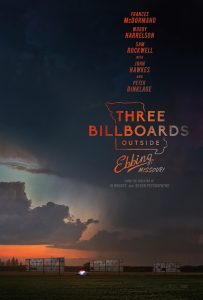
Understandably, Mildred’s plan proves quite controversial. The sheriff does his best to remain calm and collected, even going so far as to make assuaging overtures to Mildred to explain the difficult circumstances involved in this investigation. But the backlash doesn’t stop there; although many local residents sympathize with Mildred’s loss, they also believe that her efforts at calling out the sheriff in such a publicly humiliating way won’t solve anything and is patently insensitive toward him, given that he’s wrestling with personal issues of his own. Mildred’s plan draws particular ire from members of the local police force, most notably Deputy Dixon (Sam Rockwell), a hot-headed problem drinker who takes the criticism against the sheriff and his staff personally and resorts to drastic retributive measures of his own. Even members of Mildred’s own family, such as her son, Robbie (Lucas Hedges), and ex-husband, Charlie (John Hawkes), find her actions questionable, leading to a variety of reactions from gentle criticism to vile threats.
But Mildred is steely in her resolve, never backing down when confronted by those who try to intimidate her. In fact, the more the heat gets turned up on her, the more she fights back, be it through her caustic, profanity-laden tirades or through actions that are even more radical than the posting of her billboard messages. In the end, however, one can’t help but wonder whether her actions are justifiable, particularly when it becomes unclear how effective these measures are.
As becomes readily apparent, Mildred is indeed a force to be reckoned with. She knows what she wants to achieve, and she steadfastly sets out to accomplish it. That’s because she has resolute command over her beliefs, the means by which we manifest the reality we experience through the conscious creation process. And, because of this, she’s clearly someone not to be messed with.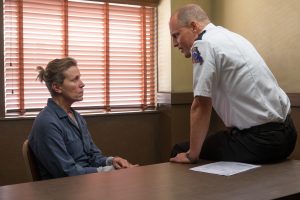 Grieving but frustrated mother Mildred Hayes (Frances McDormand, left) demands results from Sheriff Willoughby (Woody Harrelson, right) in the investigation of her daughter’s death in the new dark comedy, “Three Billboards Outside Ebbing, Missouri.” Photo by Merrick Morton, courtesy © 2017 Twentieth Century Fox Film Corporation.
Grieving but frustrated mother Mildred Hayes (Frances McDormand, left) demands results from Sheriff Willoughby (Woody Harrelson, right) in the investigation of her daughter’s death in the new dark comedy, “Three Billboards Outside Ebbing, Missouri.” Photo by Merrick Morton, courtesy © 2017 Twentieth Century Fox Film Corporation.
In managing her conscious creation skills, Mildred has developed a mastery over the elements involved in belief formation, the intellect and intuition. Intellectually, for example, she has a clear handle on what it takes to get results – namely, applying pressure to those in charge, a belief she’s formed through her research of police investigation tactics and statistics. And, intuitionally, she listens to her gut when she spies the abandoned billboards and gets the impulse to make use of them to pursue the outcome she seeks. By effectively drawing upon both sources of inspiration in belief formation, she becomes a proficient conscious creation practitioner.
Mildred enhances these practices by other means as well. For instance, in true conscious creation fashion, she has no hesitation to push past limitations that might otherwise hinder her efforts. By renting the billboards and putting the authorities under the microscope, she draws upon an unconventional, limitation-bursting technique to get results. Of course, this would not happen were it not for her willingness to push past fears, self-imposed obstacles that could otherwise inhibit her effectiveness and dilute her results. This becomes apparent, for example, when she stands her ground in the face of strong local opposition to her plans, something that those less galvanized in their beliefs might not be able to withstand. After irritating the local police force over alleged ineptitude, grieving mother Mildred Hayes (Frances McDormand, right) confronts Deputy Dixon (Sam Rockwell, left) when he disputes the criticism in director Martin McDonagh’s “Three Billboards Outside Ebbing, Missouri.” Photo by Merrick Morton, courtesy © 2017 Twentieth Century Fox Film Corporation.
After irritating the local police force over alleged ineptitude, grieving mother Mildred Hayes (Frances McDormand, right) confronts Deputy Dixon (Sam Rockwell, left) when he disputes the criticism in director Martin McDonagh’s “Three Billboards Outside Ebbing, Missouri.” Photo by Merrick Morton, courtesy © 2017 Twentieth Century Fox Film Corporation.
However, at the risk of playing devil’s advocate, one might also wonder, if Mildred is so effective as a conscious creator, then why hasn’t she realized a more satisfying and definitive conclusion from the police investigation? What’s more, as the story plays out, it seems that her plan to turn up the heat on the authorities does more to create public discord than to get results. This might even lead one to rightfully believe that her billboard scheme was fundamentally ill-conceived in the first place.
That argument certainly has merit. From a conscious creation standpoint, Mildred’s actions could be seen as an example of pushing the Universe, a practice whereby we try to force our divine collaborator in the process to produce results that either weren’t meant to be or were intended to manifest differently, either in terms of time frame or form of outcome. We may think we know the best way to achieve a particular goal, but, given that certain elements may need to be satisfied to arrive at the desired destination, our collaborator might have a better, more effective plan to get us there. And, if we try to push the Universe, it may well push back, thwarting our efforts at realizing the sought-after goal and potentially seriously compounding the frustration we’re already experiencing.
Such circumstances are particularly germane to situations that involve co-creations, as is the case here. Mildred may feel as if she’s in this battle by herself, but, when examined more closely, it’s obvious there are other players in this scenario, including the police force, the perpetrator and residents of the local community. Their “contributions” to the unfolding of this drama must be allowed to play out, which could mean that what Mildred wants may have to be put on hold, at least until those other elements fall into place. That’s not to suggest that her goal won’t eventually be achieved; however, it might take an unanticipated or protracted route to get to the desired outcome, something that Mildred may not like but that she’ll have to live with if she wants to see justice done. But, at the same time, pushing the Universe won’t get us what we want, particularly when other interests are involved and have to be addressed. Upset at his mother’s plan to spur progress in his sister’s death investigation, teenager Robbie Hayes (Lucas Hedges, left) confronts his grieving but frustrated mother, Mildred (Frances McDormand, right), in “Three Billboards Outside Ebbing, Missouri.” Photo by Merrick Morton, courtesy © 2017 Twentieth Century Fox Film Corporation.
Upset at his mother’s plan to spur progress in his sister’s death investigation, teenager Robbie Hayes (Lucas Hedges, left) confronts his grieving but frustrated mother, Mildred (Frances McDormand, right), in “Three Billboards Outside Ebbing, Missouri.” Photo by Merrick Morton, courtesy © 2017 Twentieth Century Fox Film Corporation.
This is where the power of faith comes into play in conscious creation. If we believe in the process, are clear about what we want and are willing to let our divine collaborator lead us to the sought-after result, we’ll likely see what we want achieved. This is a lesson for Mildred and may well account for why matters pan out as they do. It may not be the most satisfying way to arrive at where we want to be, but it’s often necessary on our way to becoming effective conscious creators.
Director Martin McDonagh’s dark comedy, with its ample, in-your-face gallows humor and unrelenting sailor-inspired vulgarity, takes big chances on its way to easily becoming one of the best releases of 2017. With stellar performances by McDormand, Harrelson and Rockwell, the picture keeps us guessing, even when we think we’ve figured things out, using misdirections to keep viewers captivated throughout. Despite a slight tendency to drag in the second half, the film overall is a flat-out winner, though it’s definitely not something for sensitive or squeamish viewers.
“Three Billboards” is easily a strong contender in this year’s awards competitions. It’s already picked up some notoriety, having earned three Independent Spirit Award nominations for best screenplay and for the impressive performances of McDormand and Rockwell. Look for this film to earn more kudos as awards season progresses. To get the attention of the local police force over a stalled murder investigation, a grieving mother posts pointedly critical messages on rural billboards, capturing the attention of Chief Willoughby (Woody Harrelson, left) and Deputy Dixon (Sam Rockwell, right) in the new dark comedy, “Three Billboards Outside Ebbing, Missouri.” Photo by Merrick Morton, courtesy © 2017 Twentieth Century Fox Film Corporation.
To get the attention of the local police force over a stalled murder investigation, a grieving mother posts pointedly critical messages on rural billboards, capturing the attention of Chief Willoughby (Woody Harrelson, left) and Deputy Dixon (Sam Rockwell, right) in the new dark comedy, “Three Billboards Outside Ebbing, Missouri.” Photo by Merrick Morton, courtesy © 2017 Twentieth Century Fox Film Corporation.
It’s been said the wheels of justice turn slowly, and that can be true even when the conscious creation process is employed. However, the more we stay focused on realizing an equitable outcome, supported by beliefs to make it possible, the greater the chances of seeing those hoped-for results come to life. After all, it’s only fair, and the Universe has a way of generally leaning in our direction – provided we work with it to see things through.
Copyright © 2017, by Brent Marchant. All rights reserved.
Tuesday, November 28, 2017
‘The Square’ urges us to live up to our intentions
“The Square” (2017). Cast: Claes Bang, Elisabeth Moss, Dominic West, Terry Notary, Christopher Læssø, Lilianne Mardon, Lise Stephenson Engstrom, Director: Ruben Östlund. Screenplay: Ruben Östlund. Web site. Trailer.
What does it mean to truly care for one’s fellow man? Some would contend that it involves more than just paying lip service to the notion or writing a check to a beloved charity; rather, they would say, it entails getting actively involved in bettering the well-being of others. But are we genuinely equipped to engage in such an activity? And, if so, what exactly does it take? Those are among the questions raised in the unusual and provocative new Swedish satire, “The Square.”
Christian (Claes Bang) is the respected curator of a Stockholm contemporary art museum. He prides himself on staging exhibits that make people think – not just about the art on display, but also about the messages it’s attempting to convey. He’s especially excited about his newest exhibit, The Square, a show symbolized by the simple four-sided figure and explained by the following inscription: “The Square is a sanctuary of trust and caring. Within it we all share equal rights and obligations.” It’s a noble sentiment, one that Christian hopes will inspire the exhibit’s visitors to pursue increased acts of altruism and goodwill toward their fellow man.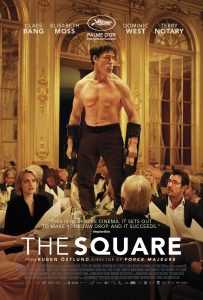
Given his position, Christian has been very successful, and he relishes the fruits that have come from his efforts – a comfortable lifestyle with all the trappings of accomplishment. In fact, he’s grown so accustomed to this way of life that sometimes it clouds his vision, causing him to periodically lose sight of other priorities, including the mission behind his work. While Christian generally strives for a balance between his professional and personal life, sometimes things nevertheless get out of kilter – such as when he’s the victim of a pickpocket incident through which he loses his wallet and cell phone, the essential life lines to his lifestyle.
The loss of these items so distresses Christian that he quickly loses all perspective. He becomes so preoccupied with retrieving the lost goods that he resorts to outlandish schemes, such as those suggested by his co-worker Michael (Christopher Læssø), to get them back. As a consequence, he begins shirking his responsibilities in other areas of his life, such as overseeing his obligations for the staging of The Square. What’s more, the divorced father even forgets about the regularly scheduled weekend visitation of his two daughters (Lilianne Mardon, Lise Stephenson Engstrom), who show up on his doorstep surprised that he didn’t remember they were coming. As matters play out, circumstances go from bad to worse as Christian loses his grip on his priorities in the wake of chasing down his material obsessions. Christian (Claes Bang), a successful contemporary art museum curator, goes to great lengths to recover his stolen wallet and cell phone when he’s the victim of a pickpocket incident in the unusual new Swedish satire, “The Square.” Photo courtesy of Magnolia Pictures.[/caption]
Christian (Claes Bang), a successful contemporary art museum curator, goes to great lengths to recover his stolen wallet and cell phone when he’s the victim of a pickpocket incident in the unusual new Swedish satire, “The Square.” Photo courtesy of Magnolia Pictures.[/caption]
Christian’s conundrum over what he actually does versus what he espouses that he (and we) should do soon escalates. Because of this, he’s quickly faced with having to put out more fires than he can possibly handle, with consequences that grow ever more complicated. In his professional life, for example, he must explain his lack of awareness of the release of an ill-advised promotional video for The Square, one that simultaneously raises questions of social propriety and freedom of speech. Personally, meanwhile, he struggles to cope with the histrionics of a would-be romantic interest (Elisabeth Moss) who’s obsessed with turning their casual involvement into a social cause, one that some would say reflects an institutionalized form of sexual exploitation while others would say is simply an interpersonal misunderstanding blown out of proportion.
How will things work out for the beleaguered protagonist? Will circumstances get straightened out, or will they continue to spiral out of control? Will Christian regain his perspective, or will he become irretrievably overwhelmed? Will he grasp the lessons of his own exhibition, or will he remain mired in what some might say is his own hypocrisy? Those are a lot of questions to be answered.
When we claim to be proponents of particular points of view, it’s a safe bet that we’ll be called on our commitment to them at some point. That’s because these contentions are beliefs, the building blocks of our reality according to the conscious creation process, the philosophy that maintains our existence comes into being as a result of them. And that’s the issue Christian is now wrestling with: Does he really believe in actively furthering the aspirations of his art exhibits, such as the benevolence and egalitarianism advocated by the spirit behind The Square? Or is he content just to talk about these ideas from an ivory tower perspective, placing more attention on the features and functions of his technological toys than engaging in hands-on initiatives designed to help those genuinely in need of assistance? Christian (Claes Bang, right), a successful contemporary art museum curator, wrestles with the unpredictable rants of Anne (Elisabeth Moss, left), a would-be romantic interest, in director Ruben Östlund’s latest offering, “The Square.” Photo courtesy of Magnolia Pictures.[/caption]
Christian (Claes Bang, right), a successful contemporary art museum curator, wrestles with the unpredictable rants of Anne (Elisabeth Moss, left), a would-be romantic interest, in director Ruben Östlund’s latest offering, “The Square.” Photo courtesy of Magnolia Pictures.[/caption]
Given Christian’s dogged pursuit of his lost items, it becomes pretty apparent where his priorities lie, at least initially. But will he be able to maintain that stance? And, if so, for how long? As the beliefs he says he maintains bubble up to the surface from the depths of his consciousness, the discrepancy between his so-called contentions and his overt actions becomes increasingly obvious. His personal belief integrity thus gets put to the test, forcing him to address the question, does he really believe in what he says he believes? And, if so, is he willing to employ those notions as part of his day-to-day activities?
The longer Christian ignores this situation, the more the problem persists, both in his conflicted consciousness and in the externalized expressions of his everyday existence. It simply won’t go away, as unwanted and unforeseen side effects related to the foregoing core questions begin to pile up. Incidents eventually compound one another and spill over into other events and exhibits at the museum, such as a formal banquet for patrons where the antics of a talented but all-too-committed performance artist (Terry Notary) get seriously out of hand. Meanwhile, outside of work, as a result of Christian’s desperate attempts to retrieve his possessions, an innocent young boy is erroneously branded a thief by his parents, an accusation that prompts the youth to then aggressively take out his frustrations on Christian.
So how should Christian respond to eliminate these problems? For starters, he needs to acknowledge his beliefs for what they are, ridding himself of the denial that’s leading to an endless cycle of complications. Then he needs to bring his actions in line with his beliefs, a sure-fire way to dispense with the ever-mounting hurdles amassing in his life. In both of these instances, he needs to live up to his beliefs, taking action to realize them and not just noting them as passing observations.
Perhaps most importantly, though, Christian needs to let go of his penchant for pushing the Universe, ditching his wrong-headed attempts at forcing our divine collaborator in the conscious creation process to bring about results that aren’t meant to be. This is most apparent in his efforts to retrieve his possessions. Maybe they were swiped and are being held at bay in an effort to get him to shift his focus and place it on something other than his smart phone settings, a scenario that he ultimately created as a means to force himself into adopting a new set of priorities – that is, as long as he grasps the message behind why these events have unfolded as they have. But, as long as he fails to acknowledge this, he’s likely to continue incurring the same kinds of problems he’s been experiencing. Given that, being willing to consider new possibilities seems far simpler comparatively speaking. Performance artist Oleg (Terry Notary, standing) gets carried away with his antics at a banquet for museum patrons in the unusual new Swedish satire, “The Square.” Photo courtesy of Magnolia Pictures.[/caption]
Performance artist Oleg (Terry Notary, standing) gets carried away with his antics at a banquet for museum patrons in the unusual new Swedish satire, “The Square.” Photo courtesy of Magnolia Pictures.[/caption]
As with director Ruben Östlund’s other films (such as “Force Majeure” (2014)), “The Square” is a picture with a lot to say. Its attempts at covering so much ground are indeed laudable, especially in the highly innovative ways it addresses its material. Yet, despite such an ambitious approach, the film doesn’t always convey its ideas as well as it could. In its moments of inspired clarity, the director absolutely knocks it out of the park with inventive, riveting humor – big, hilarious satirical episodes that arise organically and pointedly impart significant social insights. However, this strength notwithstanding, sometimes it takes the filmmaker a little too long to get the audience from laugh to laugh, a problem that could have been resolved with some judicious editing. Nevertheless, if you’re able to sift through the flotsam to find the picture’s kernels of wisdom, you’ll be richly rewarded with an unusual and memorable movie experience.
All too often, others say to us “Do as I say, not as I do,” when a simple, genuine “do as I do” would suffice (and be more meaningful). “The Square” makes an impassioned plea for us to do just that. If we and our contentions are to be taken seriously, we’d be wise to get our beliefs in order and act on them accordingly.
Copyright © 2017, by Brent Marchant. All rights reserved.
‘Last Flag Flying’ honors the power and beauty of friendship
“Last Flag Flying” (2017). Cast: Bryan Cranston, Laurence Fishburne, Steve Carell, J. Quinton Johnson, Deanna Reed-Foster, Yul Vazquez, Graham Wolfe, Cicely Tyson. Director: Richard Linklater. Screenplay: Richard Linklater and Darryl Ponicsan. Book: Darryl Ponicsan, Last Flag Flying. Web site. Trailer.
Saying goodbye is never easy, especially when a parent is forced to do so for a departed child who’s taken unexpectedly and in the prime of life. Under circumstances like these, we can use all of the support we can muster, and those who often prove most helpful are those who have already been through life-and-death experiences with us. Such is the case of a distraught father burying his deceased son in the highly moving new drama, “Last Flag Flying.”
When Vietnam veteran Larry “Doc” Shepherd (Steve Carell) loses his only child in Iraq in 2003, he’s saddled with one of the worst tragedies a parent can face. The pain is palpable, and making the right decisions is difficult. Under trying conditions like this, many of us are at least fortunate enough to turn to our spouses for support, but Larry doesn’t even have that option available, having lost his wife earlier the same year. So, to cope with this tragic situation, he turns to those whom he believes can best relate to what he’s going through – a pair of war buddies with whom he served in Vietnam. There’s just one catch – he hasn’t seen these guys in 30 years.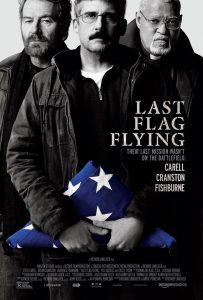
Nevertheless, thanks to an Internet search, Larry successfully locates his military kindreds, Sal Nealon (Bryan Cranston) and Richard Mueller (Laurence Fishburne). Having not been in contact with either of them in decades, Larry is not sure what to expect, but he takes a leap of faith and makes the journey from his home in New Hampshire to Virginia to find his long-lost friends.
Upon arriving down south, Larry finds Sal as a hard-partying bar owner, someone who hasn’t changed much since their days in the service together. Richard, however, has left behind the wild man days of his youth, having become a man of the cloth (but one whose old self is never too far beneath the surface, despite his best efforts to keep that persona in check). And, despite the years of separation, the three friends largely pick up where they left off. The circumstances of their reunion may differ somewhat from those of their past, but they nevertheless involve elements with which they’re all too familiar.
Larry explains his situation and asks Sal and Richard to accompany him to Arlington National Cemetery, where his son is to be buried with full military honors. And so, with varying degrees of enthusiasm and commitment, the trio sets off for the solemn task. But, upon retrieving his son’s body, Larry has second thoughts and decides he wants to lay his boy to rest at home back in New Hampshire. He again asks his friends to join him, after which the trio embarks on an odyssey of emotion, revelation and reconciliation on their way north. Old friends and Vietnam veterans Sal Nealon (Bryan Cranston, left) and Richard Mueller (Laurence Fishburne, right) help their war buddy Larry “Doc” Shepherd (Steve Carell, center) cope with the loss of his son in Iraq in 2003 in director Richard Linklater’s moving new offering, “Last Flag Flying.” Photo by Wilson Webb, courtesy of Amazon Studios.[/caption]
Old friends and Vietnam veterans Sal Nealon (Bryan Cranston, left) and Richard Mueller (Laurence Fishburne, right) help their war buddy Larry “Doc” Shepherd (Steve Carell, center) cope with the loss of his son in Iraq in 2003 in director Richard Linklater’s moving new offering, “Last Flag Flying.” Photo by Wilson Webb, courtesy of Amazon Studios.[/caption]
The train trip from Virginia to New Hampshire, with various stops along the way, gives Larry, Sal and Richard an opportunity to become reacquainted, allowing them to relive certain fond memories and to address long-unresolved issues that have simmered for three decades. It also gives each of them a chance to air their views about their respective circumstances, their service, and the government to which they and their peers have pledged their lives. They discuss how they have come to be who they are and what they want going forward. And it’s a time for healing a lot of wounds, both past and present, all in hopes of creating a future of hope, despite the current circumstances.
The anguish of circumstances like these is nearly impossible to imagine. Because of that, one can hardly fathom how any of us would draw conditions like this into our lives, the cornerstone of the conscious creation process, the means by which we manifest the reality we experience through the power of our thoughts, beliefs and intents. In fact, the most we can probably hope for is trying to understand why they happen by analyzing the means that brought them into being. Doing so may well provide some perspective behind how such scenarios come into existence and what they ultimately might mean.
On one hand, for instance, there’s the tragedy itself, one that occurs as a result of actions that unfold during a highly unpopular military conflict, the Iraq war. The loss of Larry’s son takes place at a time when many Americans began questioning the legitimacy and purpose of the country’s involvement in that melee. And, in light of that, to help keep the controversial loss of life under wraps, the government even went so far as to adopt a policy forbidding press coverage of the return of soldiers’ remains, an attempt to effectively sweep matters under the rug. But, despite officialdom’s efforts at concealing the fallout of this controversial campaign, word of the conflict still needed to get out, and sacrifices like those made by Larry’s son ultimately contributed to informing the public about a dirty little secret that the powers that be would have rather disavowed. It’s truly unfortunate that anyone would have to go to such lengths to create such awareness. But, when circumstances warrant drastic steps to make such unpalatable matters known, we’re often forced into creating limitation-bursting methods to achieve the results we seek.
It’s especially ironic that such a scenario involves the son of a Vietnam veteran, someone who was part of an even more unpopular military conflict decades before. Despite widespread public outcry against that war, Larry and his colleagues served at a time when military-eligible citizens more readily believed in the integrity of the government and its contention that the conflict was a noble pursuit. However, through their wartime experience, they became disillusioned, something that caused them to quietly question their involvement in the years after their service. And now, as Larry is confronted with the loss of his son in an equally questionable conflict, those long-repressed doubts he and others like him have held about the wisdom and legitimacy of such military involvements come rushing forth to the surface, an opportunity to make their beliefs known and available for sharing with others of like mind. In doing so, the consensus-driven, protest-based beliefs of individuals like Larry are given expression, something that might not have occurred were it not for such unfortunate circumstances. This is particularly crucial when it comes to changing the minds and making advocates out of those who may have one time seen the truth but denied their true feelings. With full military honors in place, Vietnam veterans Richard Mueller (Laurence Fishburne, left) and Sal Nealon (Bryan Cranston, center) help war buddy Larry “Doc” Shepherd (Steve Carell, right) come to terms with the loss of his son in Iraq in 2003 in “Last Flag Flying.” Photo courtesy of Amazon Studios.[/caption]
With full military honors in place, Vietnam veterans Richard Mueller (Laurence Fishburne, left) and Sal Nealon (Bryan Cranston, center) help war buddy Larry “Doc” Shepherd (Steve Carell, right) come to terms with the loss of his son in Iraq in 2003 in “Last Flag Flying.” Photo courtesy of Amazon Studios.[/caption]
All of these considerations point to the power of co-creation, the means by which we pool our manifestation resources to accomplish jointly sought goals. This is certainly apparent in the efforts aimed at raising public awareness discussed above. But it’s also present on a more personal level, such as Larry’s attempts at renewing contact with two old friends, individuals well positioned to help him get through his personal crisis. It’s also an opportunity to resolve old issues that have gone unaddressed for years, something that can help bring closure to lingering wounds and, one would hope, put the three friends on a firmer footing for the future, one that can help them renew and strengthen their existing bond – the kind of friendship we all hope to make part of our lives.
The experience of Larry, Sal and Richard indeed embodies the notion of how to look for the silver lining in the proverbial clouds of our lives. It may not be a particularly easy process, but the outcomes can yield tremendous dividends, both personally and on a wider basis. Drawing from the lessons of these circumstances can be life-changing – and life affirming – in so many ways. Despite the difficulty of these situations, we should not fear them, for there’s no telling what they ultimately might yield. The results may well surprise us – and in ways we can hardly imagine.
This latest offering from director Richard Linklater is a truly moving cinematic experience that’s not to be missed. With a rollercoaster of emotions and an intriguing road trip narrative somewhat reminiscent of “The Last Detail” (1973), “Last Flag Flying” takes viewers through an array of feelings and moods from tremendous hilarity to profound sadness, and nearly always seamlessly. Most of all, however, the film features three of the strongest male lead performances to come along in quite a while (kudos to the casting director for skillfully choosing Carell, Cranston and Fishburne for their remarkable portrayals and their unbelievable chemistry). Admittedly, the picture gets off track a few times, going on several needless tangents, but overall this strong, solid film is well worth one’s time. Just keep the handkerchief within reach.
An emotional catharsis of this order can be difficult to go through, but it’s often necessary to help us get where we want to be. Having good, old friends in our corner – especially those who are familiar with the types of conditions involved here – can prove invaluable for working our way through such experiences. Let us all hope we have companions like them available to us when we need them.
Copyright © 2017, by Brent Marchant. All rights reserved.
Monday, November 27, 2017
This Week in Movies with Meaning
Reviews of "Last Flag Flying" and "The Square," as well as a radio show preview, are all in the latest Movies with Meaning post on the web site of The Good Radio Network, available by clicking here.



Wednesday, November 22, 2017
This Week in Movies with Meaning




Tuesday, November 21, 2017
In the Top 100!
By the way, if it seems like my writings have been a bit scarce lately, you're right. I've recently been traveling and tackling a pile of personal and professional matters, so my posts have been a bit more sporadic than I'd like. But, with those issues behind me now, I'm back, and I'm ready to write! As we enter this year's movie awards season, there are plenty of new releases coming to theaters over the next few months, and I plan to be on top of them. I'll also offer my insights on the nominees of this year's awards competitions, including my annual predictions. And, of course, there'll be announcements about all of my upcoming media appearances, including my regular radio segments and my special broadcasts geared toward awards season topics and discussions of my latest book, Third Real: Conscious Creation Goes Back to the Movies. So stay tuned!
Monday, November 20, 2017
'Third Real' Now Available in eBook!
I'm thrilled to announce that my new book, Third Real: Conscious Creation Goes Back to the Movies, is now in ebook format! The title is available for various e-readers from Amazon Kindle, Nook and Kobo Books, with an iTunes release coming soon. For more information, visit this web site's Store Page or the book's official web site, where you can find details about all of the available formats and retailers. Enjoy!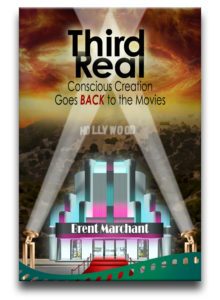
Wednesday, November 8, 2017
Do You Like What You See?

Tuesday, November 7, 2017
Check out TheCoffeeCast


